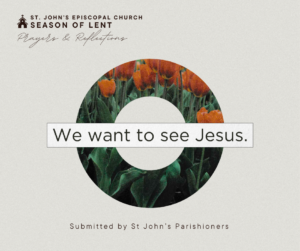
Now among those who went up to worship at the festival were some Greeks. They came to Philip, who was from Bethsaida in Galilee, and said to him, “Sir, we wish to see Jesus.”
[John 12:20-21]
Full disclosure: I am writing this reflection on Monday evening because on Tuesday, I will be driving to Columbus early in the morning to preach at Trinity Lutheran Seminary for their Tuesday Holy Week Worship. In the interest of time, I am also reworking an old sermon I preached several years ago on the Gospel reading from John, which is also the assigned Revised Common Lectionary reading for this day.
It was Passover in Jerusalem. The atmosphere of the Holy City was transformed during this most special season. The entire Jewish nation converged on Jerusalem from all corners of the ancient world to celebrate Passover.
Those who lived nearby had a comparatively easy journey. But many came from neighboring lands and traveled great distances, even from as far away as Rome. As the time of the festival drew closer, the great processions of pilgrims swelled in numbers. They came in caravans numbering hundreds and sometimes even thousands of participants.
If you’ve even been a part of a crowd at any special sporting event like the Final Four, or the Super Bowl – Pre-COVID, of course – then you might have an idea what Jerusalem was like at this time.

By Andrew Mulenga
It was into this environment that Jesus, just two days earlier, had made his triumphal entry, riding on a donkey’s colt, with the people waving palm branches. This was the third Passover that Jesus would celebrate during the time of his public ministry; his third, and last.
And again, our Gospel readings states that: “…among those who went up to worship at the festival were some Greeks. They came to Philip, who was from Bethsaida in Galilee, and said to him, “Sir, we wish to see Jesus.” [John 12:20-21]
This passage has always raised several questions for me. What were these Greeks doing in Jerusalem? What were they doing worshipping at Passover? In what language did they speak to Philip? Why did the Gospel writer, John, choose to single these Greeks out of a mass of humanity that traditionally numbered in the hundreds of thousands? Did they simply stick out like sore thumbs, or is this a first century version of ethnic profiling?
But these “Greeks” wish to SEE Jesus. Nothing indicates that they had any other need. They merely wanted to SEE him, to be in his presence, to hear his words. But there was a problem. They were not Jews. They were outsiders, so they were restricted. Historical descriptions of Passover celebrations in first century Israel indicate that in the Jerusalem Temple, there was a wall separating Gentile worshipers from the rest of the temple area and they could not go past it, which is probably why Philip had to check with Andrew.
I can’t help but wonder how those Greeks must have felt in the midst of that massive crowd. They certainly had to be in the minority. They certainly couldn’t have felt at ease among people who were not like them. In Philip they saw someone who at least may have spoken their language. Yet in spite of the discomfort, in spite of the anxiety, in spite of being strangers; they took the risk of going to Jerusalem to SEE Jesus.
Notice they didn’t say, “We came to see this beautiful Temple.” No, they came to see JESUS!
When I was a parish pastor, whenever visitors walked into our worship services, I would always wonder what brought them. I would make a beeline for them after the service and ask. In my follow-up communication I also would ask how welcome they felt in our worship setting.
I ask because as a church, any church, we need to work on hospitality. We must constantly ask ourselves how clearly do we explain our practices? We sometimes assume that because we’re familiar with the liturgy, the stranger among us also knows what we’re doing. We feel that just because there’s a bulletin in his or her hand that they can follow along.
Far too often congregations are only concerned about themselves and their own members. That statement comes from a study done by The Alban Institute entitled, Why Some Churches Don’t Grow.
Yet this pandemic, tragic as it has been, has also offered us hope.
It has given us is a greater opportunity to reach more people thanks to the wonders of technology. With fewer and fewer people coming through our doors in this day and age, more people are watching worship online than ever before.
When they tune in, how clearly do we make it known that we worship a God of grace? How clearly do we communicate that message?
It has also offered us the opportunity to be Jesus for others.
The church has plenty to do:
- to announce the gospel, the good news,
- to work for justice,
- to feed the hungry and clothe the naked.
- We are called to look for and act on opportunities to do God’s work in the world and lead by our own example of faithful service.
In these troubled times, we as a church, have the potential to offer a voice of hope in the midst of despair to those who ask, “We want to see Jesus.”
